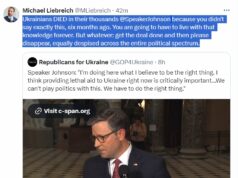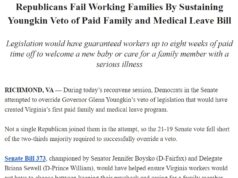Earlier today, Gov. McAuliffe vetoed this bill by Sen. Chap Petersen (SB 965: “Government Data Collection and Dissemination Practices Act; collection and use of personal information by law-enforcement agencies.”)Here’s Gov. McAuliffe’s veto statement, followed by Sen. Petersen’s response.
SB 965 (Statement is identical for HB 1673)
Pursuant to Article V, Section 6, of the Constitution of Virginia, I veto Senate Bill 965, which would significantly restrict the use of License Place Readers (LPRs) and lead to many unintended consequences affecting public safety, transportation and the efficient conduct of business in the Commonwealth.
Despite their proven success in locating stolen vehicles, identifying drivers involved in hit-and-run accidents, locating missing children and enhancing overall public safety, this bill would drastically limit the use of LPRs by law enforcement agencies. In order to use a LPR without a warrant under this legislation, agencies must prove the LPR is being used for “known relevance” data collected that are intended for prompt evaluation and that there is suspected criminal or terrorist activity. This provision is extremely narrow and could impede day-to-day operations.
This bill also sets a strict, seven day retention period for all data collected by LPRs. Many localities in Virginia retain this data for 60 days to two years. Seven days is a substantial reduction. Additionally, law enforcement agencies demonstrate that crimes are often not reported until several weeks later. Under this bill, essential data would not be available at the time of those reports. This is particularly concerning when considering implications for the National Capitol Region, where cross-state collaboration and information-sharing are essential to responding to potential criminal or terrorist activity occurring near Virginia’s borders.
Furthermore, defining vehicle license plate numbers as “personal information” could dramatically impact state and local agency operations and create public confusion. State law requires that license plates be attached to the front and rear of every vehicle, and license plates must be clearly visible and legible.
This new definition of personal information would likely prevent the live Internet transmission of video from VDOT’s traffic cameras as a violation of the state’s Government Data Collection and Dissemination Act.
The bill could potentially cripple the use of innovative, electronically-managed tolling lanes that improve the quality of life for Virginians by reducing commute times and expediting the tolling process. These projects use cameras that record license plate numbers for billing purposes, saving travelers the time they would spend waiting in line at a toll booth. The billing mechanism could be in violation of this legislation, eliminating the use of these time-saving travel options.
It would be unwise for me to sign legislation that could limit the tools available for legitimate law enforcement purposes and negatively impact public safety, or derail major transportation projects and jeopardize time-saving technologies that are essential to our economy, our citizens, tourism and the efficient conduct of business. Accordingly, I veto this bill.
First of all, I like the Governor and support his policies on economic development, which have brought thousands of new jobs to Virginia. I also consider him a friend, and sometimes friends disagree, especially when they are both Democrats.
Having said that, I believe that he’s getting some very bad advice here, both legally and politically.
First of all, this bill was not “rushed through.” The issue has been pending since March 2013, when the Attorney General ruled that License Plate Readers could not be used, except in criminal investigations. Certain police departments refused to follow that opinion, which led to these bills.Delegate Anderson and myself filed our legislation in January 2014, after a series of Washington Post articles on the unauthorized use of LPR’s. We continued our bills for a year so as to get the maximum possible input from all sides of the debate
We pre-filed our respective bills (again) before the 2015 session. There were at least four Committee hearings on our bills, as well as multiple floor debates. The final product of SB 965 was reached by a bipartisan conference committee and unanimously approved by the House and Senate in February — after a deliberative process of over a year.
Secondly, the bill is not “bad legislation.” It was carefully written to only impact “surveillance technologies” which scan and upload personal information. On its face, it applies to random data collection – not data collected pursuant to a specific investigation or from a specific encounter. Contrary to the exaggerated claims of opponents, it had no effect on cameras focused on government property or personnel.
There is no need for the Commonwealth to be collecting private information on its own citizens, without a warrant or investigation. It is time for that Patriot Act mentality to end.
Law enforcement in this state does a great job. I’m proud to support them. But they only have those powers delegated by the Constitution and state law. It is not unlimited.Today’s veto sends just the opposite message.


 Sign up for the Blue Virginia weekly newsletter
Sign up for the Blue Virginia weekly newsletter








![Sen. Mark Warner: “The best time to [pass aid to Ukraine] would have been months ago. The second best time is right now.”](https://bluevirginia.us/wp-content/uploads/2023/02/warner0207-100x75.jpg)